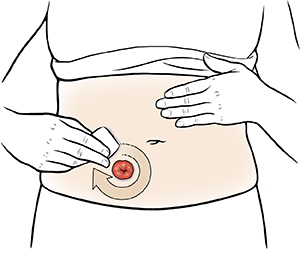Colostomy: Caring for Your Stoma
It's important to take care of your stoma and the skin around it (peristomal skin). That means keeping the stoma and the skin clean. It also means protecting the skin from moisture and contact with stool. This helps prevent skin problems and odor.
Check the stoma
Check the stoma and the skin around it each time you change your pouch. Stand in front of a mirror, or use a hand mirror so that you can see all the way around the stoma. It should look shiny, moist, and dark pink or red. The skin around it should be smooth, with no red or broken spots.
Clean around the stoma
Clean around the stoma with warm water and a soft washcloth each time you change the pouch. Water does not harm the stoma. You can even take a bath or shower without your pouch if you choose:
-
There are no nerves in the stoma, so there is no feeling. Be sure to clean and dry the stoma gently. You could injure the stoma without knowing it.
-
The stoma may bleed a little when you clean it. That’s because there are tiny blood vessels in the tissue.
Protect the skin around the stoma
For the pouch to stick well, the skin around the stoma needs to be dry and smooth. If the skin is moist or uneven, the pouch is more likely to leak. A leaky pouch will irritate the skin. It can also cause odor:
-
To help keep the skin healthy, pat it dry after you wash it.
-
If you like, apply an extra skin barrier, such as a wipe, before you put on a new pouch. This helps protect the skin if stool leaks around the pouch.

Common causes of skin problems
Common causes include the following:
-
A leaking pouch can make the skin red and weepy. Use a measuring guide to check that the opening on the pouch is the correct size.
-
Hair under the pouch can make the skin inflamed. To avoid this, shave off any hair around the stoma with an electric razor. Always shave away from the stoma.
-
Allergies to skin barriers can make the skin itch, burn, or sting. You may need to try a new skin barrier or change to a new kind of pouch.
-
Yeast infections can make the skin red and itchy. Sweat under the pouch makes these infections more likely. A pouch cover can help keep the skin dry.
When to call your ostomy nurse
Call your enterostomal therapy (ET) nurse or wound-ostomy-continence nurse if you have any of the following complications:
-
The skin around the stoma is red, weepy, bleeding, or broken
-
The skin around the stoma itches, burns, stings, or has white spots
-
The stoma swells, changes color, or bleeds slightly. If there is a large amount of bleeding, call 911 right away
-
The stoma becomes even with or sinks below the skin, or it sticks up more than normal
-
You see a bulge under the stoma or next to it
-
Diarrhea
-
Constipation
-
Sudden belly pain, cramps, or nausea